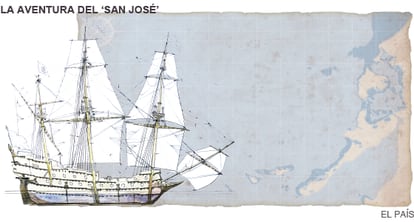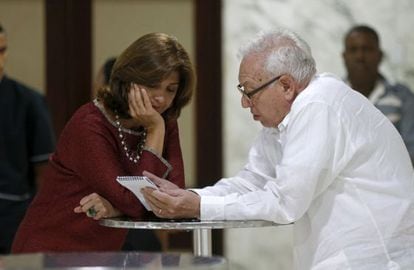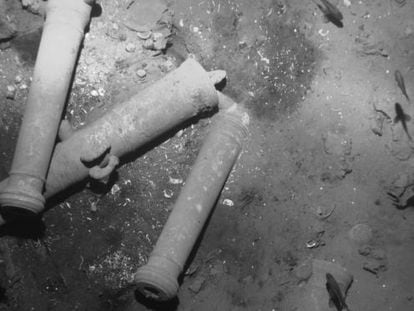Spain seeks museum deal with Colombia for sunken ship trove
Madrid looking to avoid diplomatic spat that could tarnish the countries’ excellent relations

Spain is leaning toward the idea of working with Colombia to create a museum that would hold the treasures of the Spanish galleon San José, which was sunk off the Caribbean coast by British warships in 1708.
The Spanish government is looking to reach a friendly agreement with Colombia over ownership of the sunken vessel, and avoid a diplomatic spat that could tarnish the two countries’ excellent relations, government sources have said.
Spain wants to reach a friendly agreement and avoid a lengthy legal battle, say sources
On Saturday, Spanish Foreign Minister José Manuel García-Margallo met with his Colombian counterpart María Ángela Holguín in Cartagena de Indias to discuss the issue.
Afterwards, the two foreign ministers said that Spain and Colombia are working together with the common objective to “conserve and protect” the San José, which is the “cultural heritage of humanity.”
Nevertheless, they didn’t play down their differences over ownership of the vessel.
“Spain considers it a state-owned ship with sovereign immunity,” García-Margallo said.

“This is not going to be an issue that will divide us,” said Holguín. “We will work together.”
On December 4, Colombian President Juan Manuel Santos announced that his government, along with a team of private underwater archeologists, had discovered the Spanish warship somewhere off the coast of Cartagena.
The ship was reportedly carrying silver and gold coins, precious stones and other valuables from Peru, Ecuador and Colombia when it was sunk. The treasure is estimated to be worth billions of dollars.
Santos has insisted that the ship is part of Colombia’s cultural heritage, under a 2013 law passed by the country’s lawmakers. But Spain has refused to renounce its rights to ownership of the vessel, citing UNESCO and other international treaties, which address sunken ships.
The cannon and other materials from the San José are also said to be invaluable for researchers of 18th-century Spanish colonization.
“We don’t want them to think that we want to run off with the gold,” said one Spanish diplomatic source.
Spain is aware that any legal battle for the San José will be a long one, and a favorable outcome for the Spanish government is not assured.
Colombia is not a signatory of the 2001 UNESCO treaty that recognizes ownership of sunken ships at sea to the country of the vessels’ origin. The Bogota government also does not recognize the jurisdiction of the International Court of Justice at The Hague.
In 2011, Spain won a major international case over the shipwreck of Nuestra Señora de las Mercedes, which was also sunk by British warships in 1804 off the coast of Cádiz.
The US Supreme Court ordered the Tampa, Florida-based salvage firm Odyssey Marine Exploration to give back some 500,000 silver and gold coins it plucked from the Mercedes in 2007 and secretly shipped to the United States.
But the situation with the San José is different – the vessel is in Colombian territorial waters.
“It is not the same to start legal action against a private company as it is to take on a government and much less before their own courts,” said one Spanish legal source.
A joint museum would allow Colombia to share costs with Spain
The idea for the creation of a joint museum has advantages for Santos, including allowing Spain to share the costs with his government.
Santos has said that he intended to build a museum in Cartagena to display whatever is recovered from the find.
Colombian Culture Minister Mariana Garcés said that the first stage in performing research on the underwater discovery – expected to begin next year – will require highly sophisticated laboratories, which do not exist in her country.
At the same time, some underwater archeologists have suggested leaving the shipwreck where it is for now until technology exists that would allow scientists to bring up the vessel without causing damage.
English version by Martin Delfín.











































